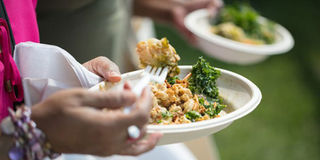Vegan meat alternatives

Although the taste of some of these products might take getting used to, stick to it and try to make it interesting with your favourite spices. Courtesy Photo
What you need to know:
Eating less meat is not only better for your health but also for the environment. However, the abundance of meat substitutes makes it hard to know which to pick. Here is the ultimate guide to choosing a vegan meat replacement for any situation.
Meat contains a large amount of protein, iron, zinc and selenium but because of the increased risk to cancer and other health problems, eating meat is rapidly diminishing.
According to Amanda Tumwebaze, a nutritionist, more people are now taking on vegetables and fruits to avail their daily nutritional needs because plant protein is said to be safer than animal protein. There are food sources that can act as good alternatives to meat.
Tofu
Although this was not as common in the past, Tofu is currently gaining popularity worldwide. The soy product besides proteins also contains all the essential amino acids required from food.
“Tofu is a great substitute for all meats. It is typically affordable and nutritious, with large amounts of iron, calcium, manganese, selenium and phosphorus. It also has the ability to absorb flavours through spices and marinades, so be liberal with seasoning before cooking it,” she says. Tofu can be found at Nakasero market and a kilogramme costs between Shs10,000 to Shs13,000. Once you are in the market, buy extra-firm tofu or freeze it and then press it. Tofu can be as firm and chewy as meat.
Tempeh
While tofu is unfermented, tempeh is a fermented soya product that is also a good replacement for meat. When making tempeh, soya beans are fermented and then pressed into a compact cake.
“It is high in protein, probiotics (live bacteria which are beneficial to the digestive health) and is a source of minerals such as magnesium, phosphorus and manganese,” says Tumwebaze.
Texturised vegetable protein (TVP)
Tumwebaze says TVP is an inexpensive ingredient made from dehydrated soy. It comes in chunks packed in sachets that range between Shs5,000 to Shs7,000 in the supermarkets around Kampala. It has a texture and structure of meat but is basically soy based. It is also listed sometimes as TSP or texturised soy protein.
Legumes and vegetables
Legumes are great protein sources. They include lentils, green peas, chickpeas and beans. Besides being good protein sources, legumes are nutrient dense foods also good for digestive health and blood sugar balance since they contain large amounts of fibre and phytonutrients, including anti-inflammatory quercetin.
“Chickpeas for instance are high in protein, containing around 14 g per cup. They are also a rich source of many minerals such as calcium, iron, copper, zinc, and manganese. They also contain vitamin K for blood coagulation as well as vitamin A, and folate,” she says.
Vegetables can also be good meat alternatives, especially if they are alternated very well. “Most dark-coloured, leafy greens and vegetables contain protein. Eaten alone, these foods are not enough to meet daily protein requirements, but a few vegetable snacks can increase protein intake, particularly when combined with other protein-rich foods. Broccoli, kale and mushrooms are good protein sources,” says Tumwebaze.
Other plant-based protein sources include grains & cereals such as oats, millet, sorghum, maize; peanuts; fruits like guavas, avocados, kiwi fruit, blackberries, oranges, bananas, chia seeds.
Caution
It is important to note that before choosing to become a vegan, Tumwebaze recommends that you have meals whose food is diversified in order to help you get all the nutrients.
“Like non vegetarian food diets, a balanced diet is highly recommended for all vegans. Eating too much of the same type of food can lead to malnutrition and wasting in people that tend to depend on plant food alone,” she says.
She advises one to have plant foods that are rich in proteins, carbohydrates, vitamins and all the trace elements in a meal.
Allergies
Amanda Tumwebaze, a nutritionist, says some people are allergic to soy products. “If you have never tasted soy products, try eating some products to see how your body reacts but it is recommended to ensure you are not allergic. This is because in some people, the allergy can cause life threatening reactions,” she warns.




